Exposed: Secret report on UK modern slavery the Home Office didn’t want you to see (full press release and TBIJ investigation copied below)
UK Modern Slavery: Foreign workers on British farms were allegedly starved, abused, denied medical care, and financially exploited – so why did the Home Office try to cover up damning evidence from its own inspections?
Original source: The Independent by Emiliano Mellio and Matthew Chapman.
British farmers have been accused of modern slavery following allegations of the widespread exploitation of seasonal workers – which the Home Office tried to prevent from being made public.
An investigation by the Bureau of Investigative Journalism (TBIJ) and The Independent has uncovered evidence suggesting that workers who had travelled thousands of miles to fill gaps in the UK’s agriculture workforce were publicly humiliated, not paid for all the hours they worked, and forced to live in substandard conditions.
The Home Office gathered the evidence in secret reports in 2021 and 2022, which it tried to prevent from being made public and were only released after a five-month battle.
The alleged mistreatment of migrants on seasonal workers’ visas is so stark that the government could be in breach of its obligations over the prevention of modern slavery, it has been claimed.
The investigation has found:
- A Ukrainian woman working as a fruit picker hired by a government-registered recruiter claims she was left “starving” after being confined to her caravan without access to medical assistance or food for 11 days when she caught Covid-19
- The worker says a colleague pulled out their own tooth after being denied dental care by the farm
- A Moldovan worker was allegedly only allowed one 15-minute break and was prevented from going to the toilet, drinking water or having any food until she hit her targets
The stories emerged after TBIJ obtained 19 inspection reports produced by the Home Office into farms that employ individuals on seasonal workers’ visas. The documents, released after a successful appeal by TBIJ, summarise the interviews and findings of the inspectors who visited the sites. The names of the farms were redacted by the Home Office for commercial reasons.
A senior Conservative who sits on the all-party parliamentary group on modern slavery and trafficking said the findings showed modern slavery was “everywhere” and the Home Office must take action when abuse is identified.
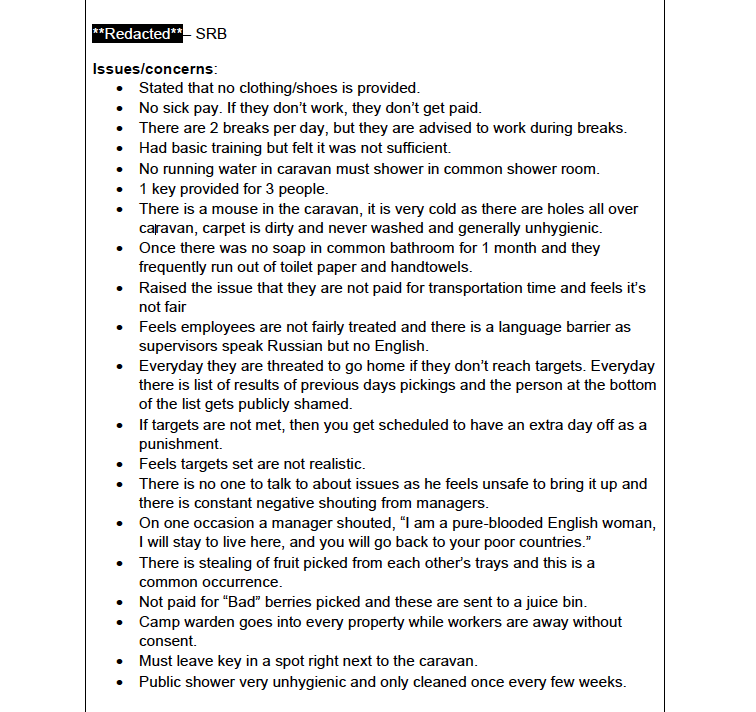
Tory MP Jackie Doyle-Price told The Independent: “What this shows is that modern slavery is everywhere. And migrant workers are as likely to be subject to it whether they come here legally or illegally.
“It is very clear that seasonal workers are a vulnerable group, and it is incumbent on the Home Office to ensure that its assessment procedures are robust and that action is taken when abuse is identified.”
The UK government launched the seasonal worker scheme in 2019 to address labour shortages, which it expected to be exacerbated by Brexit.
An initial 2,500 visas were available at its launch. This year, as many as 55,000 are expected to be issued to people from countries including Kyrgyzstan, South Africa and Ukraine to work on hundreds of farms across the UK. The reports reveal that workers involved in the scheme have faced far greater levels of exploitation than the government has previously admitted.
According to TBIJ’s analysis of the inspection reports, nearly half of the workers interviewed raised welfare issues, including racism, wage theft, and threats of being sent back home if they failed to hit their targets. At one farm, where more than a dozen people complained about being mistreated, a manager was reported to have shouted: “I am a pure-blooded English woman, I will stay to live here and you will go back to your poor countries.”
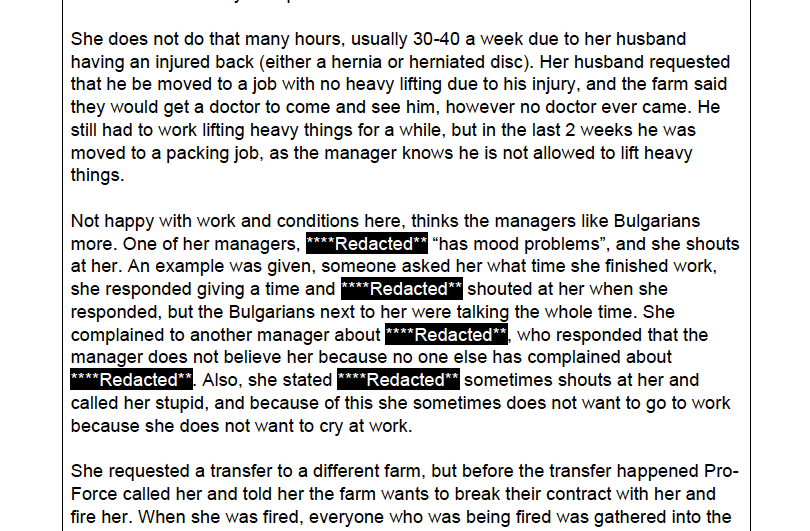
The allegations of abuse raised in the Home Office reports covered working hours and living conditions, but none have been investigated, according to a report by the Independent Chief Inspector of Borders and Immigration.
Farming minister Mark Spencer even claimed last month that people on the scheme are “very well looked after” and that employers “make sure that their welfare needs are met”.
Human rights lawyers said the failure to investigate could mean that the government has breached its obligation to prevent forced labour under the European Convention on Human Rights. Jamila Duncan-Bosu, a solicitor with the Anti-Trafficking and Labour Exploitation Unit, a charity bringing claims on behalf of modern slavery victims, accused the government of “state-sponsored exploitation”.
Unpaid hours are common, according to the Home Office reports – in nearly two-thirds of farms inspected, workers said they were not always paid for the hours they had worked or travelled, or had faced excessive deductions beyond the maximum allowed by law.
Unlike other work visas, where employers sponsor workers’ residency permits, the agricultural seasonal worker visa relies on six licensed recruiters, who often decide which farms people will work in and whether they can be transferred to other farms if they face problems or if work dries up.
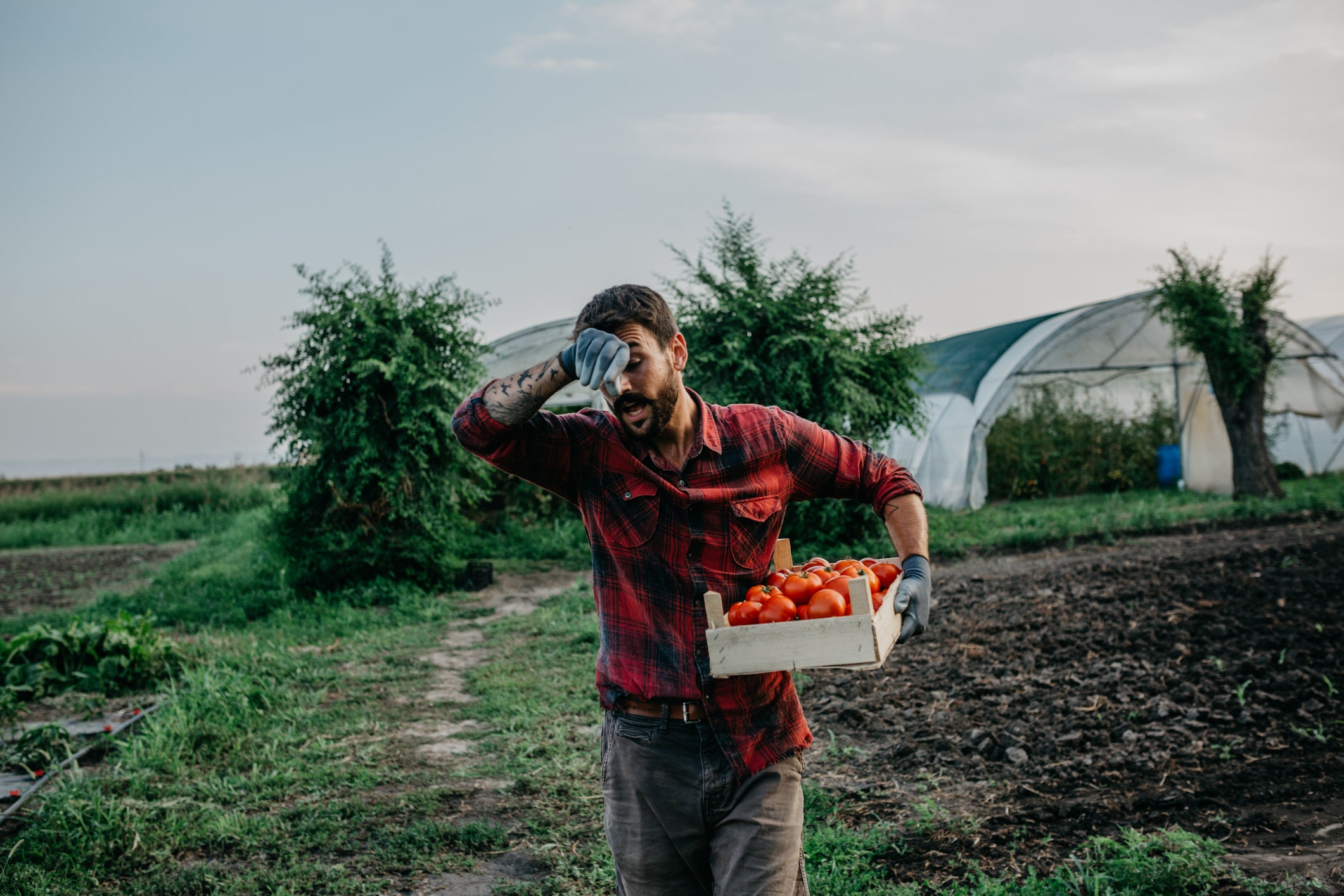
The recruiters are also required to ensure that participants are properly paid, treated fairly, and live in hygienic accommodation. Despite the numerous issues raised with the inspectors, no government-licensed scheme recruiter has lost its licence or been sanctioned for failing to meet these standards.
Meanwhile, the findings also reveal unlawful recruitment fees are more common than previously thought, with workers from six countries saying they had paid recruiters as much as £7,500 for jobs in the UK. The charging of such fees is illegal.
Liberal Democrat peer Jeremy Purvis, who is also a member of the modern slavery APPG, said the revelations were “horrifying”. He added that the government’s Illegal Migration Act would make the problem worse, by preventing those who come to the UK via illegal routes from accessing modern slavery protections.
He said ministers had “completely cut the legs off any ability for Britain to be moral leaders in the world on this”.
“Modern slavery is an ongoing issue in the UK, and Britain is inevitably a draw for many people, as other rich nations are,” he told The Independent. “But I believe very strongly that it gives us an increased moral responsibility to ensure people who are here legitimately to work are not exploited.”
In response to TBIJ’s findings, the Home Office said that “each year improvements have been made to stop exploitation and clamp down on poor working conditions”.
It added that a new team had been established to safeguard workers’ rights by “improving training and processes for compliance inspectors and creating clear published guidance for robust action for scheme operators where workers are at risk of exploitation”
Recent stories on challenges of UK seasonal worker scheme:
1. Working in the UK: Hundreds of Indonesian Citizens Escape, More Than 1,200 Workers from Indonesia Threatened to Cancel (BBC, 16th Feb 2023)
2. AG Recruitment, UK recruiter of debt-hit Indonesian and Nepali migrant workers, loses seasonal workers scheme license following forced labour related allegations, worker abscondments and asylum claims (Guardian, 10th Feb 2023)
3. Indonesian former fruit pickers become illegal immigrants and asylum seekers in the UK – ‘This is the easiest shortcut’ (BBC, 26th Jan 2023)
4. Home Office accepts recommendations in Chief Inspector’s report on immigration system as it relates to the agricultural sector (Freeths, 16th Jan 2023)
5. Immigration: Investors warn food companies about risk of forced labour on UK farms (Financial Times 19th Dec 2022)
6. Investor statement on the UK Seasonal Worker Scheme (Public Investor Statement 19th Dec 2022)
7. Hundreds of Indonesian fruit pickers in UK seek diplomatic help (Guardian, 2nd Dec 2022)
8. Seasonal worker visa puts migrants at risk of exploitation, say supermarkets (Guardian, 2nd Dec 2022)
9. Seasonal fruit pickers from Nepal left thousands in debt after being sent home early from UK farms (Guardian, 13th Nov 2022)
10. Indonesia to investigate claims fruit pickers in UK seasonal agricultural workers scheme charged thousands to work in Kent (Guardian, 29th Aug 2022)
See also: 27th July 2023: UK’s Seasonal Worker Scheme Raising Human Rights Concerns in the Food Sector.
See also: Guardian 23rd Feb 2023 – Farm workers on UK seasonal visas to be guaranteed 32 hours a week
PRESS RELEASE 23 October 2023
From : Emiliano Mellino<emilianomellino@tbij.com>
Date : Mon, 23 Oct 2023 06:01:00 +0700
Subject : Home Office failed to investigate hundreds of allegations by seasonal agricultural migrant workers – The Bureau of Investigative Journalism finds
Hi,
Please find below the press release for our latest investigation into the UK’s seasonal agricultural worker visa scheme. You can read the full investigation here.
IMMEDIATE RELEASE
Home Office failed to investigate hundreds of allegations by seasonal agricultural migrant workers – The Bureau of Investigative Journalism finds
The Home Office failed to investigate hundreds of allegations by workers who came to the UK on the seasonal worker visa, and then tried to stop the allegations from being made public, an investigation by the Bureau of Investigative Journalism (TBIJ) has found.
(You can read the full investigation here)
Following a five-month freedom of information battle, TBIJ was given access to 19 farm inspection reports produced by the Home Office between 2021 and 2022. The documents summarise interviews and findings of inspectors who visited farms employing people who came to the UK on the seasonal worker visa.
Nearly half (44%) of the 845 workers interviewed as part of the inspections raised welfare issues including racism, wage theft and threats of being sent back home. On most of the inspected farms, there were allegations of mistreatment or discrimination and more than 80% of workers interviewed on the three most complained about farms raised an issue of some sort.
But none of the allegations raised during these inspections was investigated by the Home Office or visa scheme operators, according to a report by the independent chief inspector of borders and immigration.
The revelations suggest that people who travelled thousands of miles to fill gaps in the UK’s agricultural workforce faced far greater levels of exploitation than previously thought.
Failing to investigate the abuses highlighted in the reports could mean the government has breached its obligations to prevent forced labour under the European Convention on Human Rights, according to Jamila Duncan-Bosu, a solicitor with the Anti-Trafficking and Labour Exploitation Unit, a charity bringing claims on behalf of modern slavery victims. “Essentially, it is state-sponsored exploitation,” she added.
The findings include:
- One Ukrainian woman told inspectors she was confined to her caravan without access to medical assistance or food for 11 days when she caught Covid-19. She said she was “starving” and was not provided with any support by her scheme operator, one of the small number of recruitment companies authorised by the government to arrange seasonal worker visas.
- Another person reported that a colleague was denied dental care, leading to them pulling out their own tooth.
- At another farm, where more than a dozen people complained about being mistreated, a manager was reported to have shouted: “I am a pure-blooded English woman, I will stay to live here and you will go back to your poor countries.
- In nearly two thirds (12 out of 19) of farms inspected in 2021 and 2022, workers said they were not always paid for the hours they worked, were off sick or travelled, or they faced deductions beyond the maximum allowed by law. One farm had been reported by HMRC to the Department for Business, Energy and Industrial Strategy for failing to pay the minimum wage
- In most farm inspection reports, people also said they had been mistreated. That included bullying, being publicly humiliated by supervisors and racism. When workers made complaints, some were ignored or told they could leave the farm and go back to their home countries. “Employers treat you like sh**! Always picking on you and give [sic] you extra jobs when you are already busy. There is racism,” a worker from Barbados was quoted as saying.
- People were also made to work 12-hour days or back-to-back for up to two weeks, and without having agreed to do so, according to one Home Office inspector. When they told their managers they needed a day off, the response was: “You have come here to work, so you have to work,” the official wrote.
- The findings also reveal unlawful recruitment fees are more common than previously thought, with workers from six countries saying they had paid recruiters as much as £7,500 for jobs in the UK. The charging of these fees is illegal in the UK.
- The reports contradict claims by government ministers and visa scheme operators about the treatment of seasonal workers on British farms. Last month, farming minister Mark Spencer claimed people on the scheme are “very well looked after” and that employers “make sure that their welfare needs are met”
- The visa scheme operators are required to ensure participants are properly paid, treated fairly and live in hygienic accommodation. Despite the numerous issues raised with the inspectors, no government-licensed scheme operator has lost its licence or been sanctioned for failing to meet these standards. Some have, however, been penalised when workers stayed in the UK beyond the end of their visas.
- “I think it’s very troubling that [the government] is more concerned about whether people have left the country rather than were they treated properly, fairly and with the dignity that they deserve,” said Dame Sara Thornton, the government’s former independent anti-slavery commissioner (IASC).
The Home Office refused several of TBIJ’s requests for the inspection reports, until an appeal was lodged with the Information Commissioner’s Office, which regulates data privacy and freedom of information requests. The reports were eventually released, albeit with the farm names redacted.
The Home Office argued that it was a “critical enabler of the agriculture industry” and revealing the names “would likely discourage workers from these farms”.
People who worked this summer at a farm in Herefordshire also told TBIJ about issues they faced, including bullying and discrimination. The workers went as far as taking unofficial strike action and reporting the farm to West Mercia Police, but government authorities only interviewed workers on the farm two months after the initial report was made, and after dozens of workers had left.
For more information or to arrange interviews please contact:
‘All that is missing is a whip’: Home Office ignored migrant worker abuses on farms
Original Source: TBIJ Inestigation by By Emiliano Mellino and Matthew Chapman – 23rd October 2023.
Inspectors heard hundreds of allegations of threats, wage theft, racism and appalling conditions from seasonal workers at farms across the UK, but nothing was done.
On a farm in Herefordshire, thousands of miles from her home in Bolivia, Julia Quecaño Casimiro went on strike for the first time in her life.
Julia had worked on farms in Chile for several years but said she had never experienced bullying, discrimination or wage deductions until working in the UK.
“As soon as I started, I saw that it was exploitation,” she said. “It was modern slavery.”
A recruiter in Chile had promised Julia, 23, she would earn up to £500 a week picking fruit for the duration of the five-month seasonal worker visa issued to her by the UK government.
But she was given no shifts or pay during her first week at Haygrove, one of the UK’s biggest fruit producers, in late June. The next week, she made less than £150.
For Julia and some of her colleagues the tipping point came when they were told to repay the farm £1,500 for the flights that had brought them to the UK – even though receipts show some of the tickets cost a lot less. (Haygrove accepted that this was a mistake and is investigating the overcharge with their travel agents.)
Workers were told they would have to repay £250 every week for six weeks on top of accommodation deductions. In Julia’s case, that would mean being left with only £16 on the weeks when she was given the hours guaranteed by the farm. The news prompted employees to call an urgent meeting, during which they drew up a list of demands regarding their treatment.

The following morning, having received no response, about 90 workers, including Julia, held an unofficial walkout. Their action was among the first recorded strikes by people on the UK government’s seasonal worker scheme.
“There’s no way I would have come to the UK if I’d known what was going to happen,” Julia told the Bureau of Investigative Journalism (TBIJ).
Now TBIJ can reveal that allegations of mistreatment such as those at Haygrove are common across many UK farms. There is also evidence that the Home Office knew about the allegations, failed to act on them and then attempted to stop that information from being made public.
The revelations suggest that people who travelled thousands of miles to fill gaps in the UK’s agricultural workforce faced far greater levels of exploitation than previously thought. Plus, the government could be in breach of its obligations when it comes to the prevention of modern slavery.
Haygrove told TBIJ the lack of shifts was because of “adverse weather conditions”, but that all workers were paid at least 32 hours a week at minimum wage, with £100 cash advances to new arrivals who didn’t immediately get work. The company also rebutted allegations of modern slavery and labour exploitation, adding that most of its seasonal workers “had a very positive experience”, with an “annual average return rate of 64%”.

Nearly 90 workers from Chile, Peru and Bolivia joined the unofficial strike at Haygrove

The company added that it was regularly audited by bodies including the British Retail Consortium, and claimed recent inspections by both the Home Office and Gangmasters and Labour Abuse Authority (GLAA) had found no evidence of wrongdoing. However, TBIJ understands that the Home Office has not finalised its findings and the GLAA told TBIJ that an investigation remains ongoing.
Of the 134 Latin American workers TBIJ understands were recruited, Haygrove said 85 were still with the farm.
Revealing the extent of abuse
Following a five-month freedom of information battle, TBIJ was given access to 19 farm inspection reports produced by the Home Office between 2021 and 2022. The documents summarise interviews and findings of inspectors who visited farms employing people on the same visa as Julia and her colleagues. There is no evidence to suggest that any of the reports relate to Haygrove.
Nearly half (44%) of the 845 workers interviewed as part of the inspections raised welfare issues including racism, wage theft and threats of being sent back home. On most of the inspected farms, there were allegations of mistreatment or discrimination and more than 80% of workers interviewed on the three most complained about farms raised an issue of some sort.
One Ukrainian woman told inspectors she was confined to her caravan without access to medical assistance or food for 11 days when she caught Covid-19. She said she was “starving” and was not provided with any support by her scheme operator, one of the small number of recruitment companies authorised by the government to arrange seasonal worker visas. Another person reported that a colleague was denied dental care, leading to them pulling out their own tooth.
‘It’s very troubling that [the government] is more concerned about whether people have left the country rather than were they treated properly, fairly and with the dignity that they deserve’
At another farm, where more than a dozen people complained about being mistreated, a manager was reported to have shouted: “I am a pure-blooded English woman, I will stay to live here and you will go back to your poor countries.”
The findings also reveal unlawful recruitment fees are more common than previously thought, with workers from six countries saying they had paid recruiters as much as £7,500 for jobs in the UK. The charging of these fees is illegal in the UK.
UK Modern Slavery: ‘State-sponsored exploitation’
The reports contradict claims by government ministers and visa scheme operators about the treatment of seasonal workers on British farms.
Two visa scheme operators previously told the House of Lords that only 1% of their workers had made complaints, and last month, farming minister Mark Spencer claimed people on the scheme are “very well looked after” and that employers “make sure that their welfare needs are met”.
But none of the allegations raised during these inspections was investigated by the Home Office or visa scheme operators, according to a report by the independent chief inspector of borders and immigration.
The visa scheme operators are required to ensure participants are properly paid, treated fairly and live in hygienic accommodation. Despite the numerous issues raised with the inspectors, no government-licensed scheme operator has lost its licence or been sanctioned for failing to meet these standards. Some have, however, been penalised when workers stayed in the UK beyond the end of their visas.
“I think it’s very troubling that [the government] is more concerned about whether people have left the country rather than were they treated properly, fairly and with the dignity that they deserve,” said Dame Sara Thornton, the government’s former independent anti-slavery commissioner (IASC).
Findings from a UK Visas and Immigration inspector’s farm visit in October 2021Report retrieved through freedom of information requests sent by TBIJ
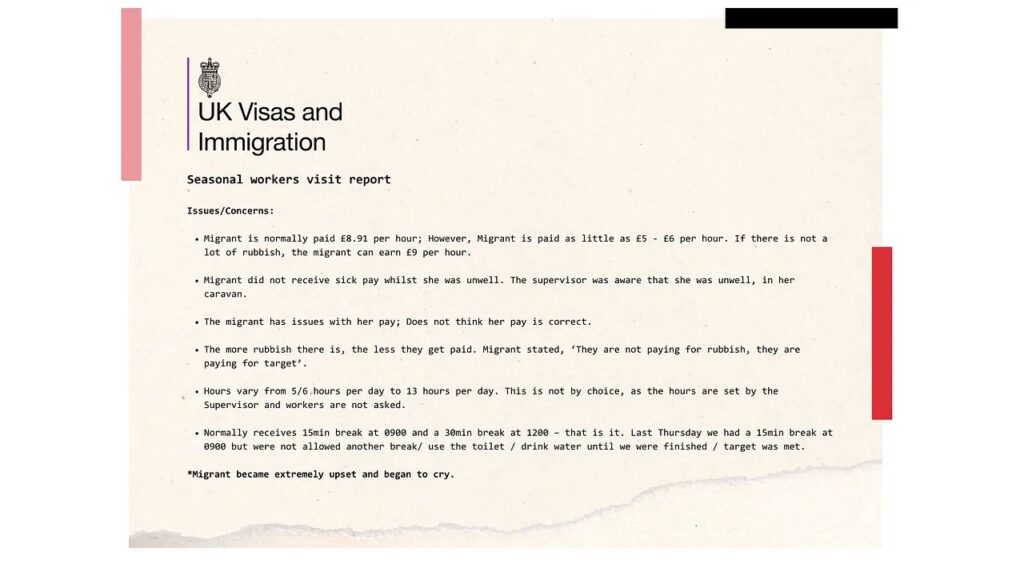
Following a government report stating that the 2019 pilot of the visa scheme uncovered “unacceptable” conditions, Thornton wrote to ministers with concerns about the risks faced by workers. She recommended reforms such as compensation for those who had paid illegal recruitment fees and a means to resolve disputes run by independent third parties. The recommendations were not implemented, and following Thornton’s departure the IASC post was left vacant for more than a year until a replacement was appointed earlier this month, despite its occupancy being a legal requirement.
‘Essentially, it is state-sponsored exploitation’
Instead, under pressure from the National Farmers’ Union, an industry association representing farmowners, the government rapidly expanded the seasonal worker visa scheme from 2,500 workers in 2019 to as many as 55,000 this year. Simultaneously, the Home Office increased the visa fee by £50 to £298 – more than twice what it costs to process it.
“With the knowledge of [the content of the reports], you’d think that it would have slowed the government down actually, but it hasn’t,” said Jamila Duncan-Bosu, a solicitor with the Anti-Trafficking and Labour Exploitation Unit, a charity bringing claims on behalf of modern slavery victims.
Failing to investigate the abuses highlighted in the reports could mean the government has breached its obligations to prevent forced labour under the European Convention on Human Rights, she said. “Essentially, it is state-sponsored exploitation,” she added.
‘Critical enabler’ of the agriculture industry
The Home Office refused several of TBIJ’s requests for the inspection reports, until an appeal was lodged with the Information Commissioner’s Office, which regulates data privacy and freedom of information requests. The reports were eventually released, albeit with the farm names redacted.
The Home Office argued that it was a “critical enabler of the agriculture industry” and revealing the names “would likely discourage workers from these farms”.
“We have transparency in supply chain legislation, which applies to businesses, but it seems that the Home Office don’t hold themselves to the same standards when it applies to schemes that they’re running,” Thornton said.
‘Employers treat you like sh**! Always picking on you and give [sic] you extra jobs when you are already busy. There is racism’
In response to TBIJ’s findings the Home Office said that “each year improvements have been made to stop exploitation and clamp down on poor working conditions”.
It added that a new team had been established to safeguard worker rights by “improving training and processes for compliance inspectors and creating clear published guidance for robust action for scheme operators where workers are at risk of exploitation”.
It is understood that the team has just half a dozen staff. To put that figure into context, there are hundreds of farms in the UK taking seasonal workers.
At the same time, the GLAA, the government body in charge of licensing labour providers and tackling exploitation in the agriculture sector, has had to consider job cuts after the Home Office slashed £1m from its £7m funding.
At Haygrove, workers have taken their complaints forward themselves. They reported the farm to West Mercia police, which referred the case to the GLAA. TBIJ understands that the GLAA interviewed four workers in late September, two months after the initial complaint had been filed and after dozens of workers had left the farm.
Chilean police are also conducting an investigation, and Julia and a colleague are in the process of filing employment tribunal claims in the UK.
Haygrove rejected all allegations of wrongdoing in the “strongest terms” and said it was not aware of any ongoing investigation.
‘All that is missing is a whip’
Haygrove workers would leave their caravans just after 4am before a coach ride of up to two hours to fields on the border with Wales. None of that time was paid, nor was the trip back. Haygrove said that on-site accommodation was available for workers who wished to avoid the daily trip.
One of Julia’s colleagues told TBIJ there were days when workers would spend 12 hours on the field but were paid for only eight. After arriving back at the caravan at 8pm, showering and cooking, they had time for only four or five hours’ sleep before the next shift. Haygrove disputed the suggestion of underpayment, saying hours worked were externally and internally audited.

Julia is speaking out to raise awareness of the issues faced by people on the UK government’s seasonal worker visa schemeNacho Rivera for TBIJ
Unpaid hours are common, according to the Home Office reports. In nearly two thirds (12 out of 19) of farms inspected in 2021 and 2022, workers said they were not always paid for the hours they worked, were off sick or travelled, or they faced deductions beyond the maximum allowed by law. One farm had been reported by HMRC to the Department for Business, Energy and Industrial Strategy for failing to pay the minimum wage.
‘Look, do you want to go home? Shush then’
During the walkout at Haygrove, the workers were visited by Justin Emery, the managing director of Fruitful Jobs. Fruitful Jobs is one of the six businesses licensed to offer seasonal worker visas for the farming sector, and although it didn’t sponsor the Latin Americans’ visas, it had been contracted to provide HR to the Haygrove workers. At the visit, however, Emery told Julia and her colleagues that if they continued to protest, their visas would be revoked.
“If you choose not to work, you are protesting, you are breaking the rules of the sponsorship,” he can be heard saying in a recording of the conversation.
He was also recorded telling a woman who is upset about working conditions: “Look, do you want to go home? Shush then.”
Emery can then be heard to say that more than 400 workers were asking for transfers, suggesting that a large proportion of people were unhappy with the pay or conditions on the farms they were at.
Fruitful Jobs told TBIJ that transfer requests were related to lower than expected working hours and not to working conditions. It said that Emery was at the farm to try to resolve issues and made his comments because the worker was interrupting. He pointed out that there was a legal obligation on visa sponsors to notify the Home Office of changes to a seasonal worker’s situation.
Findings from a UK Visas and Immigration inspector’s farm visit in August 2022. Name redacted by TBIJReport retrieved through freedom of information requests sent by TBIJ
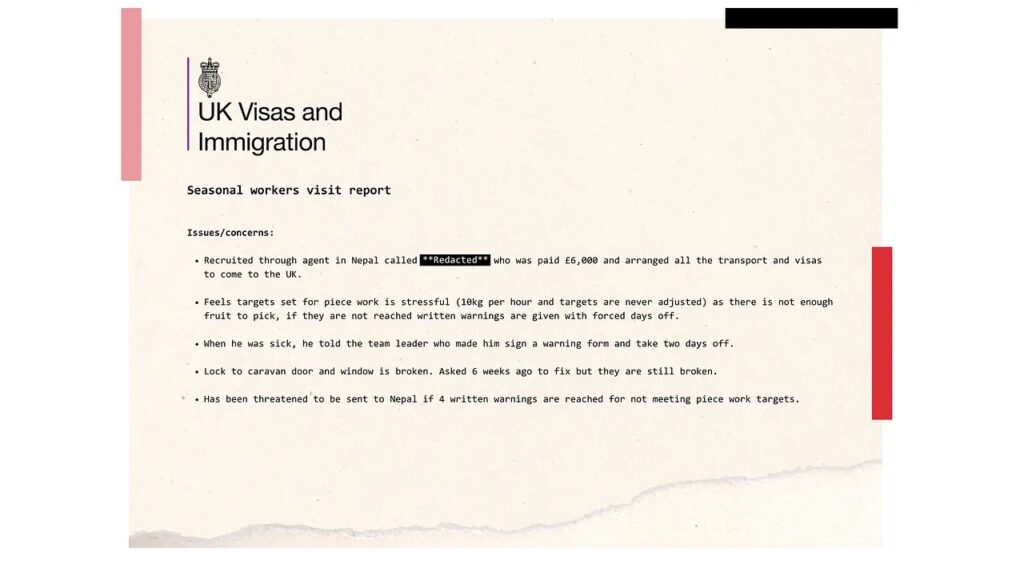
Workers at Haygrove had told Emery they were scared of supervisors at the farm. They told TBIJ they were not given water throughout the day and were shouted at to pick faster. When they didn’t hit targets or made mistakes, they said they would be forced to take unpaid time off. One worker was pushed to the ground by a supervisor when the wheel of the van he was driving got stuck in the mud, workers said.
Haygrove said it had not found any evidence of shouting, intimidation or discrimination by its supervisors and that water was always provided. It said farm picking targets were “not used to punish” but to identify higher performers who could be offered additional hours.
In most farm inspection reports, people also said they had been mistreated. That included bullying, being publicly humiliated by supervisors and racism. When workers made complaints, some were ignored or told they could leave the farm and go back to their home countries.
“Employers treat you like sh**! Always picking on you and give [sic] you extra jobs when you are already busy. There is racism,” a worker from Barbados was quoted as saying.
People were also made to work 12-hour days or back-to-back for up to two weeks, and without having agreed to do so, according to one Home Office inspector. When they told their managers they needed a day off, the response was: “You have come here to work, so you have to work,” the official wrote.
Read more from this investigation‘They treat you like an animal’: How British farms run on exploitation‘It’s almost the same as living on the street’: this is how people picking your vegetables have to liveMigrant workers are being ripped off by employers on farms‘We weren’t viewed as humans’: Migrant workers tell parliament of discrimination and cruelty on UK farms
A Moldovan worker cited in the same report began to cry when she explained she got only one 15-minute break and was prevented from taking another one, even to go to the toilet, drink water or eat, until she had hit her targets.
“All that is missing is a whip to beat people,” she said.
UK Modern SLavery: Mice, cockroaches and bed bugs
The Home Office reports echo a TBIJ investigation that found widespread mistreatment of migrant workers in more than 20 farms, nurseries and packhouses across the UK in 2022.
People reported that living conditions were unsafe and unsanitary, despite paying farmers as much as £2,000 a month for rent between six people.
A TBIJ analysis of the inspection reports reveals accommodation problems are the most common complaints from people on the scheme, with nearly a quarter raising issues with compliance officers.
On many farms, people did not have showers or toilets in their caravans. In others, there were mice, cockroaches or bed bugs. Some people said they had to share a bed with a stranger or were forced to live in cramped spaces that were often cold or mouldy.
A pregnant woman from Barbados was made to sleep in a child’s bunk bed while working on one farm. She didn’t have en-suite washing facilities, so had to walk to a communal bathroom, sometimes in the rain.
There were also complaints about privacy and safety. In several farms, managers or admin staff would enter caravans unannounced or without permission, and in others, workers had to share one key among as many as six people. In the worst of cases, there was no lock at all.
‘Labour exploitation is allowed’
Nearly 90 Chileans, Peruvians and Bolivians joined the unofficial strike at Haygrove for three days. Of them, 30 continued for nearly a week.
Isolated in the British countryside, far from home and with their visas in jeopardy, many eventually went back to work without having secured any of their demands. Since then, dozens of workers have left the farm. Each worker is now being charged the true value of their plane ticket, but other conditions have barely improved.
Petros Elia, the general secretary of United Voices of the World, a trade union supporting some of the former Haygrove workers in bringing tribunal claims, said the seasonal worker scheme is a “scam” that needs to be redesigned from the ground up with labour protections and proper enforcement.
Elia estimates it would take the workers upwards of 18 months to receive any compensation. By that time, their six-month visas would have long since ended.
“For all intents and purposes, it is impossible for most workers, even in the event of breaches, to hold their employers to acount,” he said.
Julia is now speaking out to stop others from falling into the same trap.
“In this country, labour exploitation is allowed,” she said. “The government is allowing it to happen and it’s complicit.


